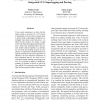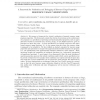25 search results - page 3 / 5 » Inferring Lower Bounds for Runtime Complexity |
ICML
2008
IEEE
14 years 6 months ago
2008
IEEE
Deep Belief Networks (DBN's) are generative models that contain many layers of hidden variables. Efficient greedy algorithms for learning and approximate inference have allow...
ACL
2011
12 years 9 months ago
2011
Via an oracle experiment, we show that the upper bound on accuracy of a CCG parser is significantly lowered when its search space is pruned using a supertagger, though the supert...
EUC
2007
Springer
13 years 11 months ago
2007
Springer
We demonstrate an improved consensus-driven utility accrual scheduling algorithm (DUA-CLA) for distributable threads which execute under run-time uncertainties in execution time, ...
ICLP
2010
Springer
2010
Springer
A Framework for Verification and Debugging of Resource Usage Properties: Resource Usage Verification
13 years 3 months ago
We present a framework for (static) verification of general resource usage program properties. The framework extends the criteria of correctness as the conformance of a program to ...
HIPC
2004
Springer
13 years 10 months ago
2004
Springer
It is well known that in a typical real-time system, certain parameters, such as the execution time of a job, are not fixed numbers. In such systems, it is common to characterize ...


